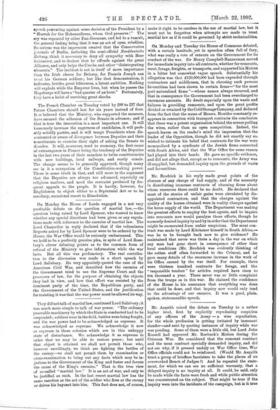They did not talk of martial law, continued Lord Salisbury;
it was much more simple to talk of war power. "The ordinary peaceable machinery by which the State is conducted had to be suspended ; soldiers were in the field, battles were being fought, and the war power had to be acknowledged as supreme. It was acknowledged as supreme. We acknowledge it now as supreme in these colonies which are in this unhappy state of disturbance. We acknowledge it as supreme in order that we may be able to restore peace ; but until that object is attained we shall not permit those who, however unwillingly, we think are fighting the battles of the enemy—we shall not permit them by examination or cross-examination to bring out any facts which may be in jurions to the Government of the King and foster and favour the cause of the King's enemies." That is the true view of so-called " martial law." It is an act of war, and only to be justified as such. In the last resort martial law has the same sanction as the act of the soldier who fires at the enemy or drives his bayonet into him. This fact does not, of course,
make it right to be careless in the use of martial law, but it must not be forgotten when attempts are made to treat martial law as if it could be governed by strict technicalities.










































 Previous page
Previous page